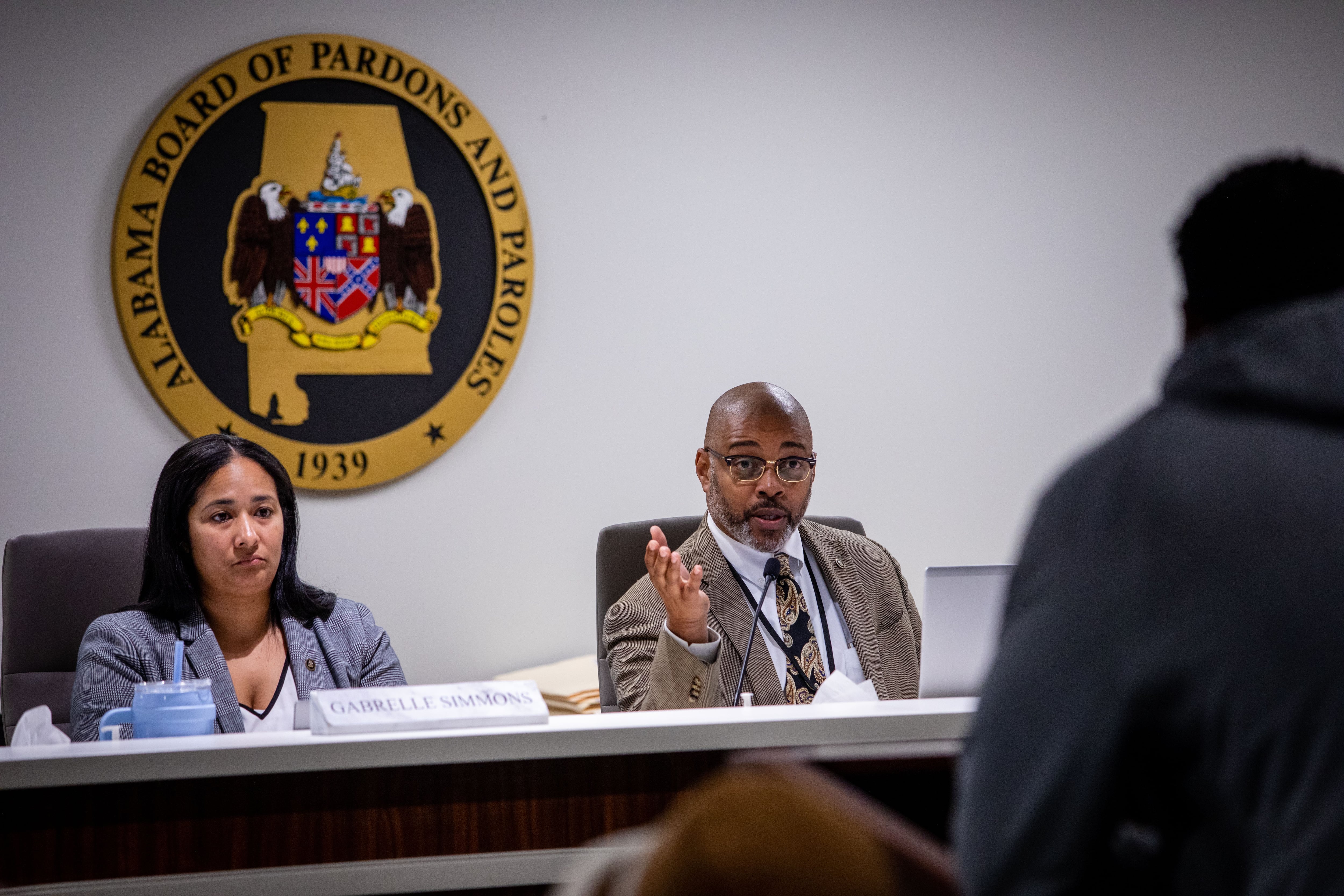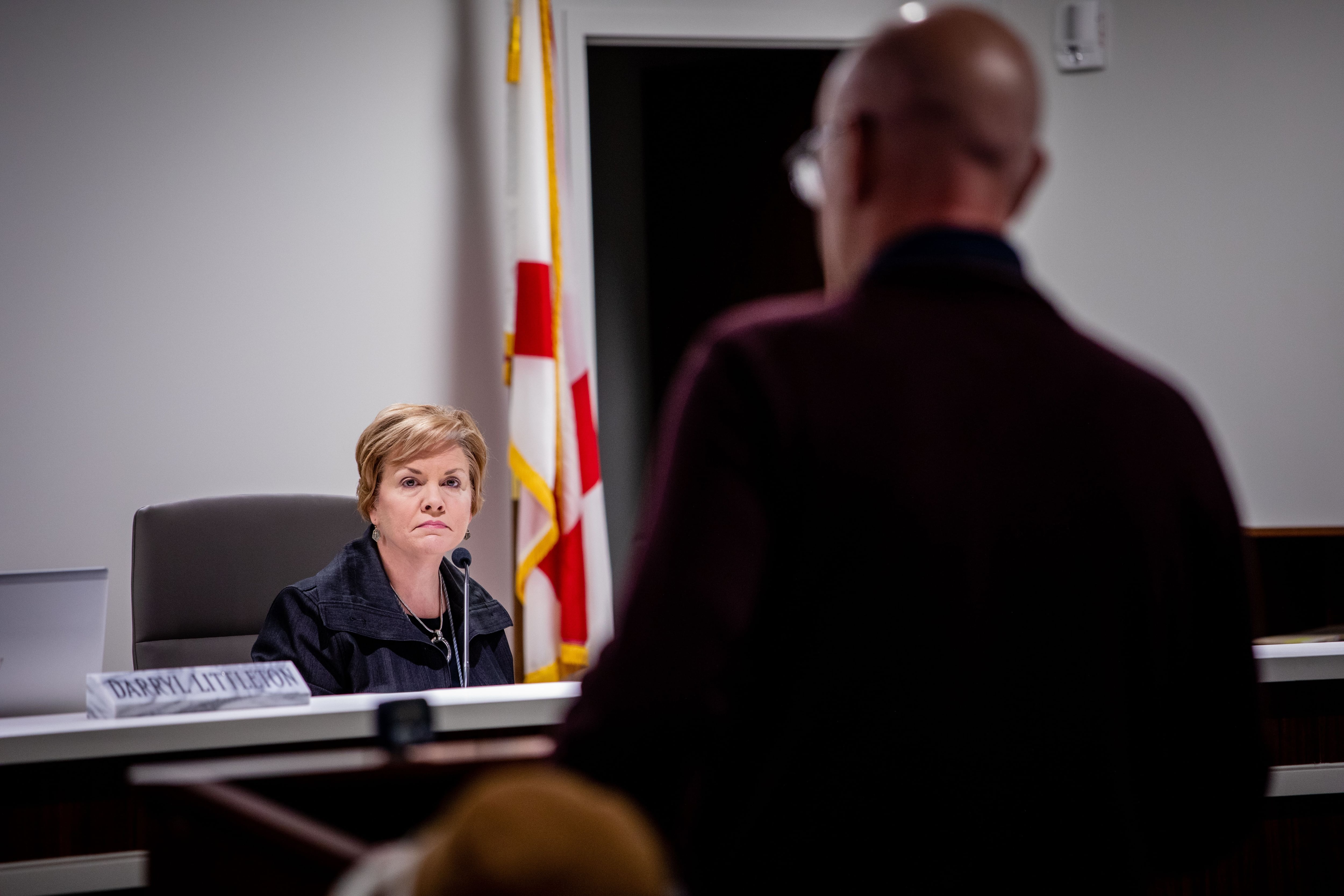An Alabama man who was sent back to prison for five years for missing a meeting was paroled on Wednesday morning.
“It’s surreal,” said Kenneth McCroskey, who was serving out his life sentence after violating the rules of his parole in 2019.
The hearing comes several months after AL.com first reported on his case as part of the series “Denied: Alabama’s broken parole system.” After AL.com wrote about McCroskey, a lawyer offered to represent him pro bono.
McCroskey was initially sentenced for a third-degree robbery in 1996. No one was hurt and he was unarmed, but due to earlier convictions, he received a life sentence. He was last denied parole in 2023.
But on Wednesday, Alabama Parole Board members Darryl Littleton and Gabrelle Simmons voted to parole McCroskey, while board Chairperson Leigh Gwathney voted to deny the 55-year-old and not hear his case for another five years.
Like all prisoners in Alabama, he wasn’t allowed to be at the hearing. Through a video presented to the board by his attorney, McCroskey said he was remorseful for his crimes and he was ready to be a productive member of society.

McCroskey was originally sent to prison for robbing a Hardee’s nearly three decades ago. He wasn’t armed, but told the cashier he had a gun. He didn’t get any money from the stick-up, but he’d had two earlier convictions, so he was sent to spend his life in prison.
He was sentenced under the state’s outdated Habitual Felony Offender Act, laws that the state has since changed. But that change didn’t affect McCroskey or anyone still serving time on the old, “three strikes, you’re out” rule.
After a decade behind bars for the failed attempt at Hardee’s, he was first granted parole in 2006.
McCroskey said he again got “caught up” with the wrong people and made bad choices. Shortly after being released, he tried to rob a Jack’s restaurant by, according to court records, reaching over the counter and trying to take the cash register.
Again, he didn’t have a weapon. And, again, he didn’t get any money. Once again no one was hurt — except McCroskey himself. Someone in the restaurant tackled him and kept him on the ground until police arrived.
That time, McCroskey was sentenced to spend 17 years in prison on a new charge of third-degree robbery. That sentence ended in 2023. But the three-strikes, 1996 sentence will remain over his head for his entire lifetime.
After that, McCroskey got his act together in prison and earned another chance. He was paroled in 2015, when Alabama regularly granted more paroles.
And he did almost everything right.
He got a good job, working at Polaris in Madison. He made his payments to the court and visited with his family. He was doing so well on parole, McCroskey said, his parole officer explained to him how to apply for a pardon once he paid off his court fines and fees.
“I can’t be that bad of a person if someone looked at it in that light,” he told AL.com earlier this year. “But of course” he sighed, “I messed that up when I didn’t report.”
But then McCroskey went to a funeral one day in 2019 instead of checking in with his parole officer, as required. That’s when he was sent back to prison for life.
“It was a poor decision, and I can’t blame it on anyone but myself,” McCroskey told AL.com earlier.
Not reporting is a technical violation. He had a hearing in a local lockup, where a hearing officer — with a recommendation from his own parole officer — recommended he be given a “dunk,” or 45 days behind bars.
But McCroskey ran into a new, stricter parole board. The parole board in 2019 didn’t take the officer’s recommendation. By then, the board had gone through a series of changes, beginning a trend of granting fewer and fewer paroles each year.
In 2023, the board let out just 8% of those who had a parole hearing. That’s compared to just six years ago, when more than half of those who had a parole hearing were granted release. And the drop in paroles came despite federal claims that Alabama’s prisons are already dangerously and unconstitutionally overcrowded.
Even though he hadn’t committed any new crimes, the 2019 board sent McCroskey back to serve his life sentence for the missed meeting.
He’s hardly the only one facing years in prison for a technical violation. The latest available data from the board shows that 13 people were revoked for technical offenses in February. Since September 30, 2023, there’s been 257 people on parole sent back to prison without new criminal charges.
McCroskey went up for parole in 2023, and no one seemed to notice. The state did not speak in opposition to his release, and he didn’t have a lawyer. He was denied.
This time, people noticed.

Following AL.com’s reporting on his case, attorney Lauren Faraino contacted McCroskey and offered to help. Her colleague Melina Goldfarb, who is also Faraino’s cofounder in the Justice Accountability Coalition, represented McCroskey at his hearing this week.
“Mr. McCroskey has demonstrated to the board that he is not a risk to public safety and has taken full responsibility for his past actions. His significant personal growth and commitment to change have been recognized. We have full confidence that Mr. McCroskey will contribute wonderful things to his community on his return home,” Goldfarb told AL.com.
The state also noticed.
Despite no one speaking in opposition to his release in 2023, and despite McCroskey receiving no disciplinaries in prison since that hearing and no facts changing in his case, a representative from the Alabama Attorney General’s Office and a representative from Victims of Crime and Leniency, or VOCAL, both spoke against McCroskey on Wednesday.
The representative from VOCAL spoke briefly and asked he not be let out, but did not indicate she had spoken with any of his past victims.
The Attorney General’s Office on Wednesday cited McCroskey’s criminal record from the 1990s and the fact he was convicted in various counties. They also mentioned prison disciplinaries, but didn’t offer the dates of those offenses nor mention that they hadn’t happened since his last denial.
But the parole board has changed again, and is no longer routinely denying nearly all paroles.
Starting in January, several members of the board seemed to increase their ‘yea’ votes, letting more and more inmates out on parole.
Numbers from January show a 23% parole rate, far higher than the 8% rate of 2023. And February’s data, which is the latest available, shows a 24% grant rate. So far, the fiscal year average parole rate is 20%.
Goldfarb, McCroskey’s lawyer, said she was “thrilled” with the split decision on Wednesday.
As a condition of his parole, McCroskey was ordered to wear a GPS ankle monitor and join Narcotics and Alcoholics Anonymous.
He was also required to register with ALEX, or the Alabama Experience. ALEX is a mobile expo that travels across the state to help people find jobs.
McCroskey said he plans to return to north Alabama and live with his uncle, a disabled veteran. He already has a job at a car repair shop and hopes to one day become a master HVAC technician, building upon the skills he learned from classes in prison.
The NA and AA requirement of his parole comes after McCroskey said in his video that he would be seeking out the groups, along with grief counseling. He lost his mother three years ago while he was in prison.
“She was really the only thing I actually had,” he added in his video to the board. “I feel and know that I’m going to be productive in society.”
Denied: Alabama's broken parole system
- Alabama lawmakers distance themselves from parole board, families say loved ones ‘stuck for life’
- Alabama argued to keep Lowe’s shoplifter in prison. Roy Moore came to his defense.
- Alabama paroles hit historic lows last year: Here’s what changed amid scrutiny in 2024
- They want to ‘die with a clear conscience.’ But in Alabama, pardons are harder to come by
- Battered woman shot her abuser 32 years ago. Alabama’s parole board won’t let her out.
This project was completed with the support of a grant from Columbia University’s Ira A. Lipman Center for Journalism and Civil and Human Rights in conjunction with Arnold Ventures.
